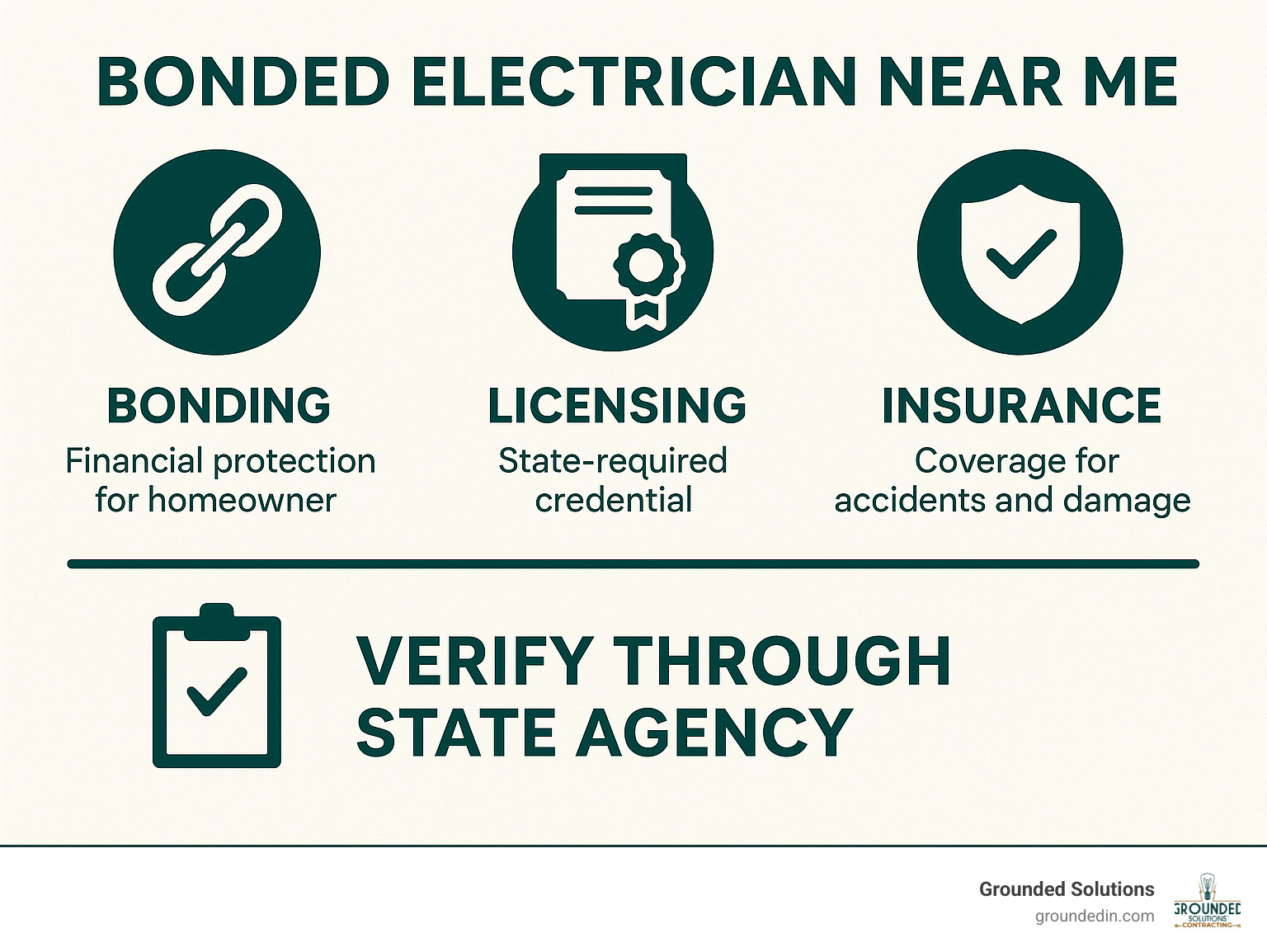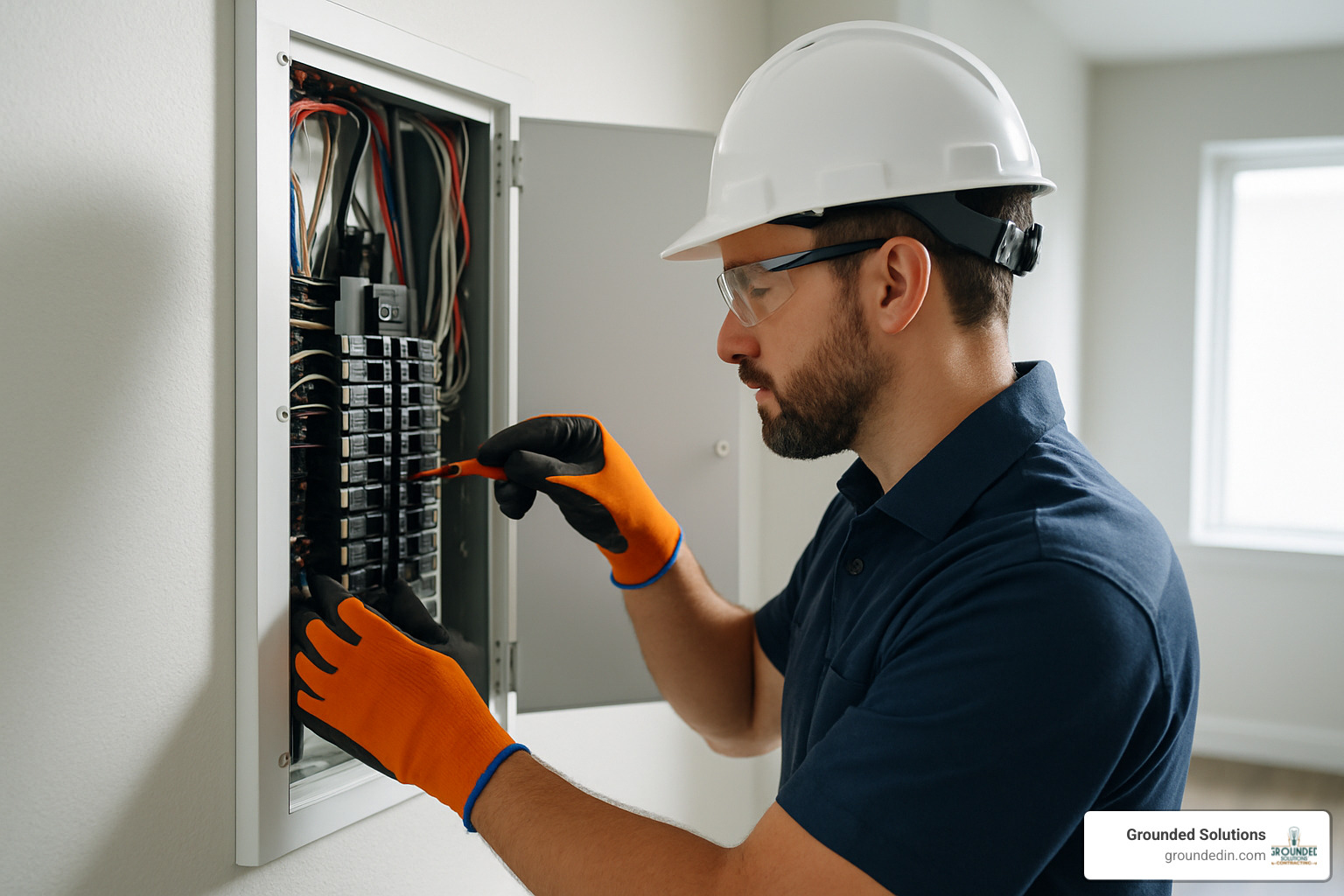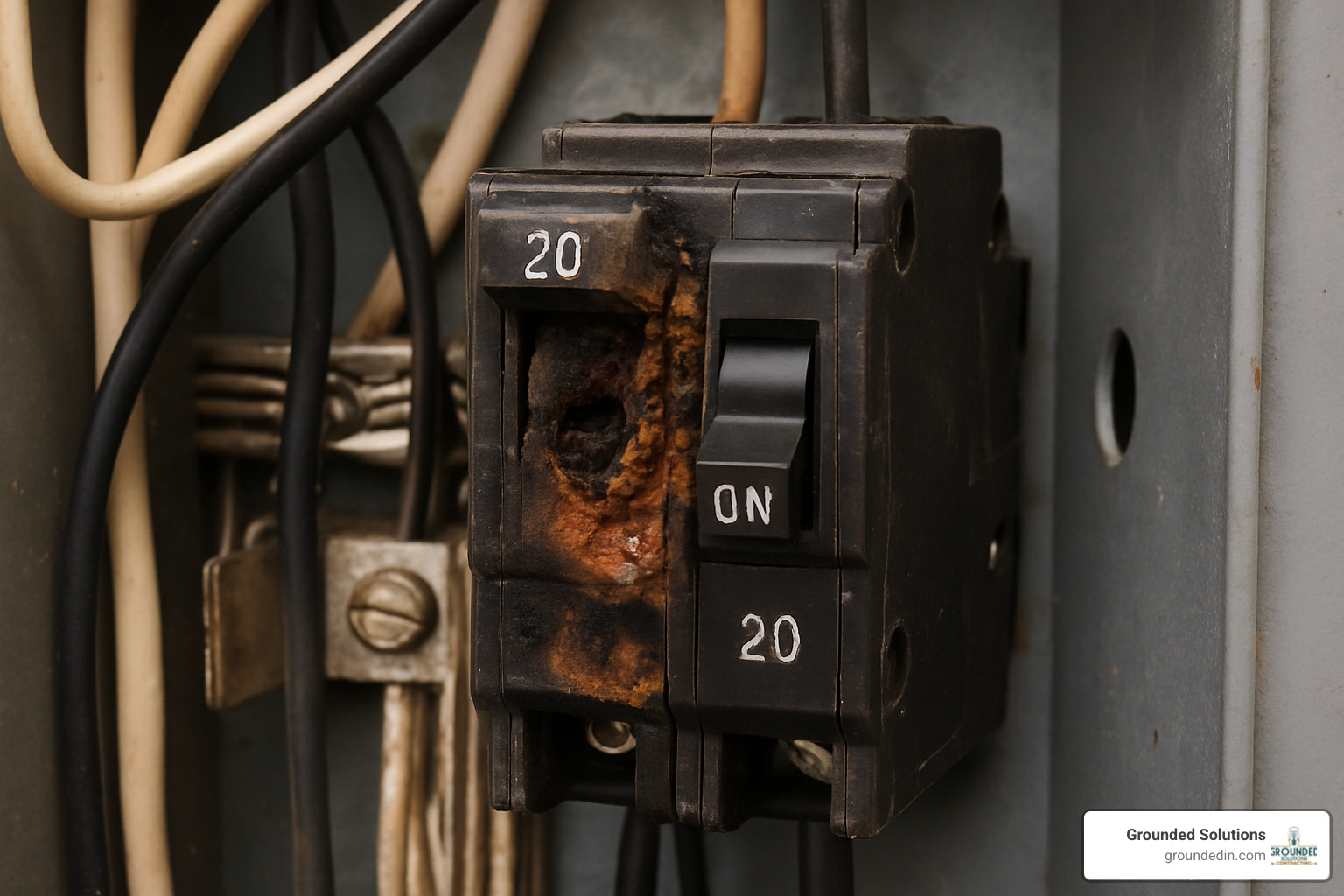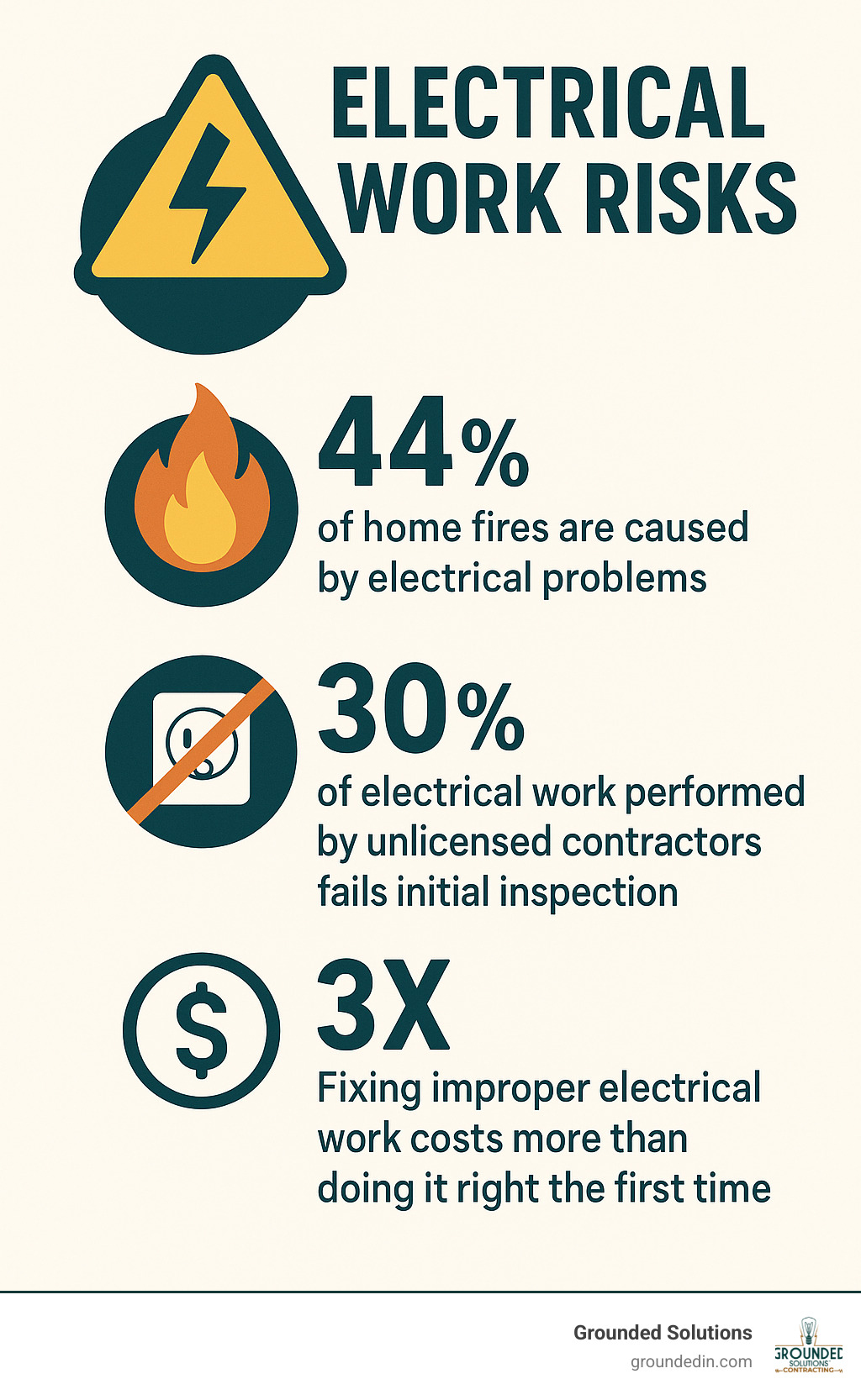Why Finding a Bonded Electrician Near Me is Your First Step to Electrical Safety
When searching for a bonded electrician near me, you’re looking for more than just someone who can wire outlets and fix breakers. You need a professional who provides financial protection, follows safety codes, and gives you peace of mind. Here’s what to look for:
Quick Answer for Bonded Electrician Near Me:
- Bonded = Financial guarantee protecting you if work goes wrong
- Licensed = State-verified skills and code knowledge
- Insured = Coverage for accidents and property damage
- Verify all three through Indiana Professional Licensing Agency
- Required for panel upgrades, rewiring, and major electrical work
Electrical work isn’t just about keeping the lights on—it’s about safety, code compliance, and protecting your investment. In central Indiana, where homes range from historic Indianapolis neighborhoods to modern suburban developments, electrical systems face unique challenges.
The reality is stark: faulty electrical work causes thousands of house fires annually and can void your insurance coverage. Yet many homeowners unknowingly hire contractors who lack proper bonding, leaving them vulnerable to financial loss and safety hazards.
As Clay Hamilton, President of Grounded Solutions with over two decades of electrical and mechanical expertise in central Indiana, I’ve seen how proper bonding protects both contractors and clients throughout the Indianapolis area.

Bonded electrician near me terms at a glance:
What Does “Bonded” Mean? Understanding a Bonded Electrician Near Me
When you’re searching for a bonded electrician near me, you’re looking for someone who’s made a financial promise to you—backed by a third party. A surety bond isn’t just paperwork. It’s your safety net when things go sideways.
Here’s how it works: When an electrician gets bonded, they purchase a guarantee from a surety company. This company essentially tells you, “If this electrician messes up your job, fails to follow the rules, or causes damage through their mistakes, we’ll pay you back.” It’s like having a financial bodyguard for your electrical project.
Think of bonding as a three-way promise between you (the homeowner), the electrician, and the surety company. If your contractor disappears halfway through rewiring your kitchen or installs a panel that fails inspection, you can file a claim with the surety company.
| Credential | What It Covers | Who Provides It | Your Protection |
|---|---|---|---|
| Bonded | Work completion, code violations, contractor negligence | Surety company | Financial compensation for covered losses |
| Licensed | Technical competency, code knowledge | State licensing board | Assurance of qualified workmanship |
| Insured | Accidents, property damage during work | Insurance company | Coverage for jobsite incidents |
Bonded Electrician Near Me vs. Licensed & Insured
While you need all three credentials working together, each one protects you differently. Licensing proves your electrician knows the difference between a neutral wire and a ground wire. Insurance covers accidents—like when someone accidentally puts a drill through your drywall.
But bonding is your guarantee that the job will actually get done right. It covers the “what ifs” that keep homeowners up at night: What if the electrician doesn’t pull the required permits? What if their work fails inspection because it doesn’t meet code?
Bond guarantees go deeper than just finishing the job. They cover permit compliance, which means if your electrician fails to get proper permits or their work doesn’t pass inspection due to code violations, the bond helps cover the costs of fixing everything.
Why States (Including Indiana) Require Bonds
Indiana’s bonding requirements aren’t bureaucratic busy work—they’re rooted in the Indiana Electrical Code and a genuine commitment to public safety. When you pull an electrical permit in Indianapolis, Fishers, or any central Indiana community, your contractor’s bond information becomes part of the official record.
The bonding requirement also helps maintain industry standards naturally. Contractors who consistently deliver poor work find it increasingly difficult and expensive to maintain their bonds.
Why Hiring a Bonded Electrician Near Me Matters for Your Home or Business
Picture this: you’ve just spent thousands on a beautiful kitchen renovation, and three months later, the electrical inspector shows up and fails your wiring. The contractor you hired? He’s vanished, and his phone goes straight to voicemail. Without a bonded electrician near me, you’re stuck paying for the mistakes twice.
This scenario plays out more often than you’d think across central Indiana. When you choose a bonded contractor, you’re not just buying electrical services—you’re investing in peace of mind and financial protection.

Risk mitigation becomes your safety net when electrical projects go sideways. Avoiding house fires is the big one—and it should be. But the everyday risks matter just as much. Think about incomplete work that leaves you without power during Indianapolis’s summer heat waves, or code violations that surface during a home sale.
Workmanship assurance protects your biggest investment. It’s not enough for your outlets to work today. They need to work safely for decades, pass future inspections, and meet your insurance company’s requirements.
Dispute resolution becomes surprisingly simple with bonded contractors. Instead of heated arguments or expensive legal battles, you have a clear path forward when problems arise.
Financial & Legal Safeguards
The claim process isn’t as complicated as it sounds, but it’s incredibly valuable when you need it. You start by documenting the problem and trying to work things out with your contractor. If that doesn’t work, you file a claim with the surety company.
Surety payouts cover more than just fixing bad work. They can include permit fees for corrective work, inspection costs, and even temporary housing expenses if electrical problems make your home unsafe.
Contractor accountability works because surety companies don’t like paying claims. Contractors who generate multiple claims face higher premiums or lose their ability to get bonded altogether.
Real-World Consequences of Using Non-Bonded Contractors
Fire hazards represent the worst-case scenario, but they’re more common than most people realize. When unbonded contractors cut corners to save money, they’re gambling with your family’s safety.
Failed inspections create a domino effect of problems. Your project gets red-tagged, work stops, and you’re responsible for bringing everything up to code—regardless of who created the mess.
Insurance voids represent a hidden danger that many homeowners find too late. Insurance companies investigate electrical fires carefully, and they can deny claims if they determine that unqualified or unbonded contractors caused the damage.
The bottom line? Finding a bonded electrician near me isn’t just about following regulations—it’s about protecting your family, your home, and your financial future.
How to Verify a Bonded, Licensed, and Insured Electrician in Central Indiana
Finding a bonded electrician near me requires more than just a quick Google search—you need to do your homework. The good news? Verification is straightforward when you know where to look and what questions to ask.
Your first stop should be the Indiana Professional Licensing Agency. Their online database is a goldmine of information about licensed contractors and their bonding status. It’s free, it’s official, and it’s updated regularly.
When you contact potential electricians, ask for their bond certificate right away. This document contains everything you need to know: the surety company backing them, the bond amount, and—crucially—the expiration date.
Don’t forget to request a Certificate of Insurance (COI) while you’re at it. This shows their current general liability and workers’ compensation coverage.
Permit records tell a story that many homeowners overlook. Contact your local building department and ask about the contractor’s history. Do they consistently pull proper permits? Do their jobs pass inspection on the first try?
For deeper insights into selecting qualified electrical professionals, check out our detailed guide on Choosing a Licensed Electrical Contractor.
Step-by-Step “Bond Check” Checklist
Start with online database verification by visiting the Indiana Professional Licensing Agency website. Search for your contractor’s license number and verify their active status.
Review all paperwork carefully once you receive it. The bond certificate should clearly show the surety company, bond amount, and expiration date.
Make reference calls to recent customers, but ask the right questions. Don’t just ask if they were happy with the work—dig deeper. Did the contractor handle permits properly? Did the work pass inspection?
Bonded Electrician Near Me: Red Flags to Avoid
Expired bonds are surprisingly common and create dangerous gaps in your protection. Always verify that bonding is current and won’t expire during your project.
Vague documentation or reluctance to provide specific bond information should make you nervous. Professional electrical contractors understand that bonding is part of doing business properly.
No physical address raises serious questions about legitimacy. Established electrical contractors maintain proper business locations because they plan to be around when you need follow-up service.
A bonded electrician near me search should yield contractors who welcome verification. The right professional will appreciate your diligence because it shows you understand the importance of proper credentials.
Electrical Projects That Demand a Bonded Pro
Some electrical projects are simply too important—and too risky—to trust to anyone but a bonded electrician near me. These aren’t your basic outlet replacements or light switch swaps. We’re talking about the heavy-duty work that forms the backbone of your home’s electrical system.
Panel upgrades top the list of projects requiring bonded professionals. If you’re still running on that old fuse box from the 1960s, or if your current panel can’t handle your family’s modern electrical needs, upgrading to a 200-amp system isn’t a weekend DIY project. It requires coordination with your utility company, multiple inspections, and the kind of expertise that comes with proper training and bonding protection.
Whole-house rewiring presents even greater complexity. Whether you’re renovating a historic Indianapolis home or dealing with dangerous aluminum wiring from the 1970s, rewiring involves working around existing structures while bringing everything up to current code. One mistake can create fire hazards that last for decades.
The growing popularity of electric vehicles has made EV charger installations increasingly common throughout central Indiana. These high-amperage circuits require specialized knowledge of GFCI requirements and load calculations. Get it wrong, and you could overload your electrical system or create safety hazards.
Commercial build-outs operate under entirely different rules than residential work. From three-phase power requirements to specialized equipment installations, commercial electrical work demands contractors who understand business electrical needs and commercial code requirements.
Generator tie-ins might seem straightforward, but they require precise coordination with utility companies and strict adherence to transfer switch requirements. Improper installation can create dangerous backfeed conditions that put utility workers and your neighbors at risk.
Modern homes packed with sensitive electronics benefit from whole-house surge protection. While surge protectors seem simple, proper installation requires understanding of grounding systems and electrical panel integration that only experienced professionals possess.
Code corrections often surface during home sales or insurance inspections. Bringing older electrical systems up to current standards requires knowledge of both historical electrical practices and modern code requirements—expertise that comes with proper training and bonding protection.
Common Warning Signs You Need Professional Help
Your electrical system usually gives you warning signs before serious problems develop. Flickering lights might seem minor, but they often indicate loose connections or overloaded circuits that can lead to electrical fires. Don’t ignore them, especially if the flickering happens consistently.
Hot outlets demand immediate attention from a bonded professional. Outlets that feel warm to the touch indicate dangerous conditions developing inside your walls. This isn’t something to investigate yourself—it’s time to call for help.
Tripping breakers serve as your electrical system’s safety valve, but frequent trips signal underlying problems. Whether caused by overloaded circuits, ground faults, or failing equipment, persistent breaker trips require professional diagnosis and repair.
Perhaps most alarming are burning odors coming from electrical panels, outlets, or switches. These smells often precede electrical fires and require immediate response from qualified electricians. When you smell burning plastic or electrical components, don’t wait—call a professional immediately.

Residential & Commercial Scope in Central Indiana
Home renovations throughout Indianapolis, Carmel, Fishers, and surrounding communities often trigger electrical updates. That dream kitchen remodel needs additional circuits for modern appliances. Finishing your basement requires new lighting and outlet installations. Adding a home office means ensuring adequate power for today’s technology needs.
Each of these projects must balance functionality with safety while meeting current electrical codes. What worked in older homes often doesn’t meet today’s standards for electrical capacity and safety features.
Commercial tenant improvements require contractors familiar with business electrical needs. Office lighting updates, data circuit installations, and specialized equipment connections all demand different expertise than residential work. Commercial electrical codes differ significantly from residential requirements.
Retail fit-outs present unique challenges that combine aesthetic considerations with functional requirements. Proper lighting creates the right atmosphere while adequate power supports point-of-sale systems and specialized equipment. Meanwhile, everything must meet commercial code requirements for public spaces.
The key thread connecting all these projects is the need for proper bonding protection. When electrical work involves significant complexity, multiple inspections, and long-term safety implications, hiring a bonded electrician near me provides the financial protection and professional accountability these projects demand.
Finding and Vetting the Right Bonded Electrician Near Me
The search for a reliable bonded electrician near me can feel overwhelming, but breaking it down into manageable steps makes the process much clearer. Start with online reviews, but don’t just skim the star ratings—dig deeper into what customers actually say about the electrical work itself.
Look for reviews that mention permit handling, inspection results, and post-completion support. These details tell you far more than generic “great service” comments.
Better Business Bureau ratings offer another valuable perspective on how contractors handle problems when they arise. Every business faces challenges—what matters is how they respond.
Nothing beats referrals from recent customers who can share real experiences. When talking to references, ask specific questions about communication style, cleanup practices, and whether the work passed inspections without issues.
The on-site estimate gives you the best opportunity to evaluate potential contractors face-to-face. Professional electricians ask thoughtful questions about your needs, explain relevant code requirements, and provide detailed proposals.
For comprehensive guidance on evaluating electrical contractors, our detailed resource 10 Essential Tips for Hiring the Best Electrician in Your Area covers additional factors to consider during your selection process.
Key Questions to Ask Before Signing a Contract
Before committing to any electrical contractor, have a conversation that covers the essential protection and service details. Bond amount should align with your project scope and local requirements—larger projects typically need higher bond amounts.
Warranty terms deserve careful attention and clear explanation. Understand exactly what’s covered, how long the warranty lasts, and the process for accessing warranty service.
Project timeline discussions should include realistic milestones like permit approval, inspection scheduling, and completion dates.
Permit responsibility should be clearly established upfront. Professional electrical contractors typically handle all permit applications, coordinate inspections, and ensure compliance with local codes.
Trusted Directories & Third-Party Resources
Your local building department maintains valuable information about contractors who regularly work in your area. These contractors have established relationships with local inspectors and understand specific municipal requirements.
Building departments often track which contractors consistently pull proper permits and pass inspections—valuable indicators of professional competence and code knowledge.
Professional associations like the Independent Electrical Contractors maintain member directories and often hold members to higher standards than general contractor listings.

The investment in finding the right bonded electrician near me pays dividends in safety, code compliance, and peace of mind. Take the time to verify credentials, check references, and ask the right questions—your electrical system and family’s safety depend on making the right choice.
Frequently Asked Questions About Bonded Electricians
What does a bond cover that insurance doesn’t?
Here’s where things get interesting—and where many homeowners get confused. A bonded electrician near me provides protection that goes far beyond what insurance covers, and understanding this difference could save you thousands of dollars.
Insurance is like a safety net for accidents. If an electrician accidentally damages your drywall while running new wiring, insurance covers the repair. But what happens if that same electrician walks away from your project halfway through, leaving you with exposed wires and no way to get your power restored? Insurance won’t help you there—but a bond will.
Bonds specifically cover contractor obligations and performance guarantees. When your electrician fails to complete work as promised, violates electrical codes, or doesn’t fulfill their contractual commitments, the bond steps in.
The bond also covers code compliance issues that insurance typically excludes. If your electrical work fails inspection because the contractor didn’t follow proper procedures, the bond can cover the costs to bring everything up to code.
Are bonded electricians required for small jobs?
The short answer is yes—and here’s why that matters more than you might think. Indiana’s bonding requirements don’t distinguish between replacing a single light switch and rewiring an entire home. Every electrical contractor should be bonded, regardless of project size.
This might seem like overkill for small jobs, but we’ve seen how quickly “simple” electrical work can create expensive problems. A basic outlet replacement can cause house fires if the contractor doesn’t understand proper grounding techniques or uses incorrect wire gauges.
The bonding requirement ensures accountability at every level. Whether you’re hiring someone to install a ceiling fan or upgrade your electrical panel, you deserve the same level of protection and professionalism.
How much bond coverage should I look for?
Bond amounts in Indiana typically range from $10,000 to $50,000 for residential electrical contractors, with commercial contractors often carrying higher coverage. But here’s what really matters: the bond amount should be appropriate for your specific project and the contractor’s scope of work.
For most residential electrical projects—from service upgrades to new construction wiring—a $25,000 bond provides solid protection. However, the coverage amount is less important than verifying the bond is current and valid.
The key is ensuring the bonded electrician near me you choose maintains continuous coverage throughout your project. A good contractor will provide documentation showing their bond remains active well beyond your project completion date.
Conclusion
Finding a bonded electrician near me isn’t just about checking boxes—it’s about protecting your family, your property, and your peace of mind. After two decades of electrical work throughout central Indiana, I’ve learned that the difference between a successful project and a costly nightmare often comes down to one simple question: Is your contractor properly bonded?
The stories are heartbreaking and all too common. A family in Fishers finds their “bargain” panel upgrade failed inspection, leaving them without power and facing thousands in corrective work. A small business owner in Carmel finds out their electrical work voids their insurance coverage after a minor fire. A homeowner in Zionsville learns that their kitchen renovation’s electrical work must be completely redone because the original contractor cut corners.
These situations are entirely preventable when you choose a bonded electrician near me who stands behind their work with proper credentials and financial protection.
At Grounded Solutions, we’ve built our reputation on being central Indiana’s fully licensed, bonded, and insured electrical team. We understand that when you invite us into your home or business, you’re trusting us with more than just wires and circuits—you’re trusting us with your safety and your investment.
Whether you’re planning a kitchen renovation in Brownsburg that needs additional circuits, installing EV charging in Westfield for your new electric vehicle, or upgrading an electrical panel in Greenwood to handle modern demands, the right contractor makes all the difference. We deliver safe, code-compliant installations backed by comprehensive protection and the kind of local expertise that only comes from serving the same communities where we live and work.
The peace of mind that comes from working with properly bonded professionals isn’t just worth it—it’s essential. Don’t gamble with your family’s safety or your financial security by cutting corners on electrical work.
Ready to move forward with confidence? Contact Grounded Solutions today to discuss your electrical project with central Indiana’s trusted bonded professionals. Let us show you why homeowners and businesses throughout the Indianapolis area trust us to get electrical work done right the first time, every time.
